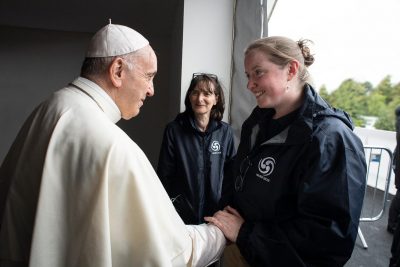
By Sarah Mac Donald - 20 August, 2020

Pope Francis, Anne Griffin General Manager WMOF and Laura Phelan staff WMOF
Pope Francis has appealed to people to use the Covid-19 crisis as an opportunity to make the world a better place by repairing injustices, helping the poor and protecting the environment.
During his weekly general audience on Wednesday, the Pope said that any vaccine developed to protect against the Coronavirus must help everyone and not be prioritised for the rich.
“It would be sad,” he said, if priority for a vaccine “were to be given to the richest. It would be sad if this vaccine were to become the property of this nation or another, rather than universal and for all”.
He said the pandemic had exposed the plight of the poor and the great inequality in the world.
“The virus, while it does not distinguish between people, has found, in its devastating path, great inequalities and discrimination. And it has exacerbated them!” he said.
In his address, Pope Francis said the response to the pandemic must be a dual approach. On the one hand, it is essential to find a cure for “this small but terrible virus, which has brought the whole world to its knees”.
On the other, he stressed, a larger virus must also be cured – that of social injustice, inequality of opportunity, marginalisation, and the lack of protection for the weakest.
The two-pronged response to healing is rooted in the Church’s ‘preferential option for the poor’ and this, the Pope underlined, was not a political option nor an ideological option. “The preferential option for the poor is at the centre of the Gospel,” he said.
Acknowledging that everyone is worried about the social consequences of the pandemic, he noted that many people want to return to normality and resume economic activities.
“Certainly, but this ‘normality’ should not include social injustices and the degradation of the environment. The pandemic is a crisis, and we do not emerge from a crisis the same as before: either we come out of it better, or we come out of it worse. We must come out of it better, to counter social injustice and environmental damage.”
“Today we have an opportunity to build something different. For example, we can nurture an economy of the integral development of the poor, and not of providing assistance.”
However, he acknowledged that aid is important and described the voluntary sector as one of the best structures of the Italian Church.
“But we must go beyond [aid], to resolve the problems that lead us to provide aid – an economy that does not resort to remedies that in fact poison society, such as profits not linked to the creation of dignified jobs. This type of profit is dissociated from the real economy, that which should bring benefits to the common people, and in addition is at times indifferent to the damage inflicted to our common home.”
He said the preferential option for the poor, “this ethical-social need that comes from God’s love” inspires us to conceive of and design an economy where people, and especially the poorest, are at the centre.
It also encourages us to plan the treatment of viruses by “prioritising those who are most in need”.